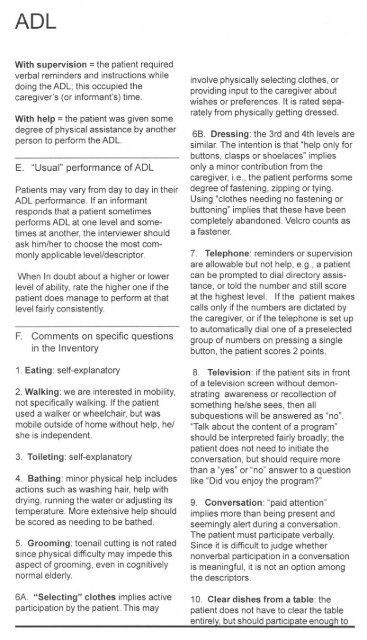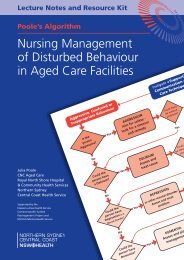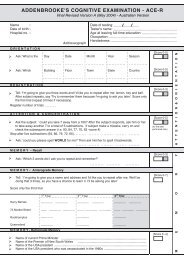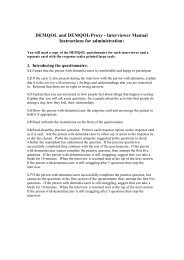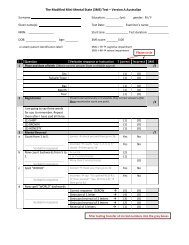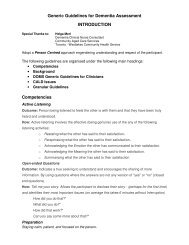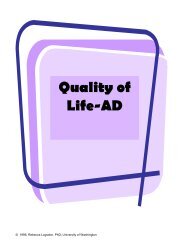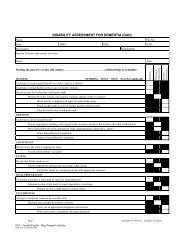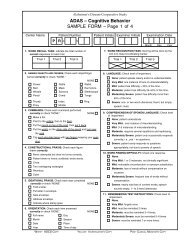ADCS-ADL Scale, Scoring and Manual - Dementia Outcomes ...
ADCS-ADL Scale, Scoring and Manual - Dementia Outcomes ...
ADCS-ADL Scale, Scoring and Manual - Dementia Outcomes ...
You also want an ePaper? Increase the reach of your titles
YUMPU automatically turns print PDFs into web optimized ePapers that Google loves.
<strong>ADL</strong><br />
With supervision = the patient required<br />
verbal reminders <strong>and</strong> instructions while<br />
doing the <strong>ADL</strong>; this occupied the<br />
caregiver's (or informant's) time.<br />
With help = the patient was given some<br />
degree of physical assistance by another<br />
person to perform the <strong>ADL</strong>.<br />
E. "Usual" performance of <strong>ADL</strong><br />
Patients may vary from day to day in their<br />
<strong>ADL</strong> performance. If an informant<br />
responds that a patient sometimes<br />
performs <strong>ADL</strong> at one level <strong>and</strong> sometimes<br />
at another, the interviewer should<br />
ask him/her to choose the most com-<br />
monly applicable level/descriptor.<br />
When In doubt about a higher or lower<br />
level of ability, rate the higher one if the<br />
patient does manage to perform at that<br />
level fairly consistently.<br />
F. Comments on specific questions<br />
in the Inventory<br />
1. Eating: self-explanatory<br />
2. Walking: we are interested in mobility,<br />
not specifically walking. If the patient<br />
used a walker or wheelchair, but was<br />
mobile outside of home without help, he/<br />
she is independent.<br />
3. Toileting: self-explanatory<br />
4. Bathing: minor physical help includes<br />
actions such as washing hair, help with<br />
drying, running the water or adjusting its<br />
temperature. More extensive help should<br />
be scored as needing to be bathed.<br />
5. Grooming: toenail cutting is not rated<br />
since physical difficulty may impede this<br />
aspect of grooming, even in cognitively<br />
normal elderly.<br />
6A. "Selecting" clothes impliesactive<br />
participationbythe patient.This may<br />
involve physically selecting clothes, or<br />
providing input to the caregiver about<br />
wishes or preferences. It is rated separately<br />
from physically getting dressed.<br />
68. Dressing: the 3rd <strong>and</strong> 4th levels are<br />
similar. The intention is that "help only for<br />
buttons, clasps or shoelaces" implies<br />
only a minor contribution from the<br />
caregiver, i.e., the patient performs some<br />
degree of fastening, zipping or tying.<br />
Using "clothes needing no fastening or<br />
buttoning" implies that these have been<br />
completely ab<strong>and</strong>oned. Velcro counts as<br />
a fastener.<br />
7. Telephone: reminders or supervision<br />
are allowable but not help, e.g., a patient<br />
can be prompted to dial directory assistance,<br />
or told the number <strong>and</strong> still score<br />
at the highest level. If the patient makes<br />
calls only if the numbers are dictated by<br />
the caregiver, or if the telephone is set up<br />
to automatically dial one of a preselected<br />
group of numbers on pressing a single<br />
button, the patient scores 2 points.<br />
8. Television: if the patient sits in front<br />
of a television screen without demon-<br />
strating awareness or recollection of<br />
something he/she sees, then all<br />
subquestions will be answered as "no".<br />
"Talk about the content of a program"<br />
should be interpreted fairly broadly; the<br />
patient does not need to initiate the<br />
conversation, but should require more<br />
than a "yes" or "no" answer to a question<br />
like "Did vou enjoy the program?"<br />
9. Conversation: "paid attention"<br />
implies more than being present <strong>and</strong><br />
seemingly alert during a conversation.<br />
The patient must participate verbally.<br />
Since it is difficult to judge whether<br />
nonverbal participation in a conversation<br />
is meaningful, it is not an option among<br />
the descriptors.<br />
10. Clear dishes from a table: the<br />
patient does not have to clear the table<br />
entirely, but should participate enouQ,hto


